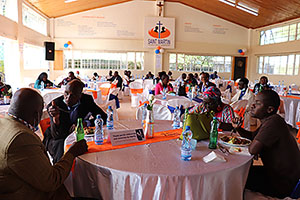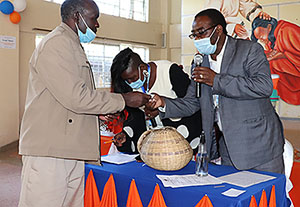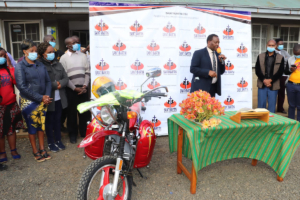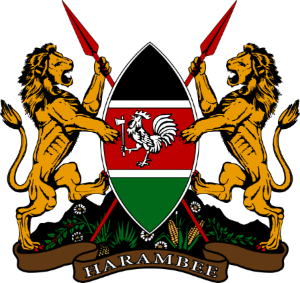Living solidarity
Rundbrief Nr. 6, November 2021
 If a young couple wants to get married, their friends form a committee, which organises the wedding and collect the necessary money for it among the friends. For example, they compile a list with all the items needed for the wedding feast and distributes it to the friends of the couple. Each can then pledge for an item: 5 of the 10kg rice or two chickens from one's own chicken coop. Additionally, a kind of entertainment afternoon is organised. As entrance fee, you buy a handkerchief and Chai and Mandazi are ready . for a little fee. The master of ceremony then organises various little games, all with the aim of contributing to the budget of the big day.
If a young couple wants to get married, their friends form a committee, which organises the wedding and collect the necessary money for it among the friends. For example, they compile a list with all the items needed for the wedding feast and distributes it to the friends of the couple. Each can then pledge for an item: 5 of the 10kg rice or two chickens from one's own chicken coop. Additionally, a kind of entertainment afternoon is organised. As entrance fee, you buy a handkerchief and Chai and Mandazi are ready . for a little fee. The master of ceremony then organises various little games, all with the aim of contributing to the budget of the big day.
The same is true for funerals: The mourning family doesn't have to organise anything, friends and neighbours take care of that. This includes the entertaining of the guests of condolence before the funeral as well as the funeral itself with the subsequent meal for the numerous guests. Or if a high hospital bill occurs: There is a collection until the amount is reached. Everyone gives as much as he or she can. And everyone gives gladly, because they know that next week they could find themselves in a situation where they are dependent on such support.
Fostering solidarity
 My two partner organizations work with this solidarity. It is already high in the communities, but what is often lacking is the attention to recognize people in need and the knowledge to help them properly. Say a person with mental health problems: when someone starts acting strange or becomes increasingly isolated, the family and neighbours often do not know what it is and how to deal with it. The affected person does not receive any help, or not the right one, and is increasingly marginalized. This is where St. Martin CSA comes in. The organization informs the community about the various forms of mental illness and shows the treatment options. It recruits volunteers to help identify cases and manage them. St. Martin then organizes the medical assessment, provides initial support and works out a viable, long-term solution together with the volunteers and the community.
My two partner organizations work with this solidarity. It is already high in the communities, but what is often lacking is the attention to recognize people in need and the knowledge to help them properly. Say a person with mental health problems: when someone starts acting strange or becomes increasingly isolated, the family and neighbours often do not know what it is and how to deal with it. The affected person does not receive any help, or not the right one, and is increasingly marginalized. This is where St. Martin CSA comes in. The organization informs the community about the various forms of mental illness and shows the treatment options. It recruits volunteers to help identify cases and manage them. St. Martin then organizes the medical assessment, provides initial support and works out a viable, long-term solution together with the volunteers and the community.
With this last point, solidarity comes into play again. Thanks to it, the person concerned is assured of the often long-term medication and is re-integrated into the community (see newsletter no. 1). The role of St. Martin CSA is to raise awareness in society for a specific topic and to guide the community towards resolving an issue through solidarity.
On a larger scale
 The same principle also works on a larger scale. The St. Martin CSA's mental health project has so far been financed entirely by donations from the population. To this end, the organization has been holding a big annual fundraising for two years. First, a committee was formed to organize the activities. The committee is made up of personalities from society: business people, politicians, clergy, but also the head of the market women organization or the president of the motorcycle taxis. Their first decision was that they remain on this committee for the entire three years of the project's duration. It then discussed which actions should be carried out and set the cornerstones of the planning. St. Martin CSA takes care of the detailed planning. So it was decided that a fundraising lunch should be held at the beginning of December with speeches, singing and dancing. For this purpose, people from the personal networks of the committee members are invited to support the project financially. One can do this in public at the lunch or whenever desired. There will also be a raffle sale. In preparation for the campaign, appearances are being organized in dozens of parishes in the St. Martin catchment area in order to raise awareness of the topic and the fundraising campaign.
The same principle also works on a larger scale. The St. Martin CSA's mental health project has so far been financed entirely by donations from the population. To this end, the organization has been holding a big annual fundraising for two years. First, a committee was formed to organize the activities. The committee is made up of personalities from society: business people, politicians, clergy, but also the head of the market women organization or the president of the motorcycle taxis. Their first decision was that they remain on this committee for the entire three years of the project's duration. It then discussed which actions should be carried out and set the cornerstones of the planning. St. Martin CSA takes care of the detailed planning. So it was decided that a fundraising lunch should be held at the beginning of December with speeches, singing and dancing. For this purpose, people from the personal networks of the committee members are invited to support the project financially. One can do this in public at the lunch or whenever desired. There will also be a raffle sale. In preparation for the campaign, appearances are being organized in dozens of parishes in the St. Martin catchment area in order to raise awareness of the topic and the fundraising campaign.
Soweit nichts wirklich Ungewöhnliches, Fundraising wie man es auch in der Schweiz durchführen könnte. Bis dann an einer der Sitzungen beschlossen wird, dass das Komitee eigentlich selber für das Essen aufkommen könnte. Der angefragte Caterer hat grad die detaillierte Offerte eingereicht und sich bereit erklärt, für das Kochen und der Service nichts zu berechnen, das sei sein Betrag zum Projekt. Innerhalb weniger Minuten haben die Kommitteemitglieder dann die einzelnen Posten untereinander aufgeteilt und das Essen für 150 Personen ist gesichert.
On the Sundays before the lunch, we swarm out and visit various churches in the area. The pastors and priests gave St. Martin time during the service to present the mental health project and to promote the fundraising campaign. One Sunday I accompany them: There are twelve of us and we visit eleven churches around Kinamba, about 30 km north of Nyahururu. James and I are assigned the Kinamba Catholic Church and we attend three masses. At the end of each, we are given five minutes to introduce ourselves and the project. This is a common practice that always involves the entire St. Martin staff.
My contribution
Meine Aufgabe ist es, St. Martin CSA und L’Arche Kenya dabei zu helfen, ihre Arbeit bekannter zu machen – und damit auch ihren Ansatz der «Hilfe zur Selbsthilfe» auf der Ebene der Gemeinschaft. Im erwähnten Fundraising bin ich Mitglied im Komitee und helfe dabei, die Werbeunterlagen für die Unternehmen zu gestalten oder den Live-Stream des Events zu organisieren. Und natürlich leiste ich auch meinen direkten Beitrag: Bei der Hochzeit habe ich die neuen Schuhe des Bräutigams und beim Lunch die Süssgetränke beigesteuert.
My job is to help St. Martin CSA and L’Arche Kenya to make their work better known - and thus also their approach of "helping people to help themselves". In the aforementioned fundraising, I am a member of the committee and help to design the advertising materials for the business owners or to organize the live stream of the event. And of course, I also make my direct contribution: I contributed the groom's new shoes to the wedding and the sweet drinks at the fundraising lunch.
Greetings from Nyahururu

Contradiction
Unfortunately, at the national level, the picture is different. In 2020, Kenya ranked 124th out of 180 countries in the Transparency International's Corruption Perception Index (the higher up the list a country is, the less it is perceived as corrupt; Switzerland is in 4th place). State corruption in procurement is particularly criticized in Kenya. But even with simpler business transactions, something is often passed along on the side. Or an external agent is needed, which makes the transaction opaque. Bribery and nepotism are the most common forms of corruption. But it must also be said that Kenya has steadily worked its way up over the past ten years. For example, in 2019 the acting finance minister and some of his employees were arrested by the responsible public prosecutor for corruption. [1]
The contradiction remains: Why can't what works well on a small scale not be applied on a large scale? Probably the sheer size of the amounts of money that are involved plays a role. And then there would also be a need for increased awareness and the right moderators.
Ubuntu and Harambee

Ubuntu is a term that can be found in variants in many Bantu languages ​​(Zulu: ubuntu, Chewa: umunthu, Kikuyu: umundu, etc.) It is often translated as humanity or as "I am because we are". The idea behind this is that an individual can only be human thanks to the society in which he is embedded. When someone shares and lives the same values ​​and practices of a group, she becomes an authentic person. Personal individuality is not denied, but it is always part of and grounded in a community. «A person is a person through other people strikes an affirmation of one’s humanity through recognition of an "other" in his or her uniqueness and difference. It is a demand for a creative intersubjective formation in which the "other" becomes a mirror (but only a mirror) for my subjectivity. This idealism suggests to us that humanity is not embedded in my person solely as an individual; my humanity is co-substantively bestowed upon the other and me. Humanity is a quality we owe to each other. We create each other and need to sustain this otherness creation. And if we belong to each other, we participate in our creations: we are because you are, and since you are, definitely I am. The "I am" is not a rigid subject, but a dynamic self-constitution dependent on this otherness creation of relation and distance.”(1) The concept causes the community to be consciously warm and hospitable to its members, but also to strangers. And it enables them to work together. It has found its way into development and leadership strategies as well as philosophy and diplomacy.
(1) Eze, M. O., 2010, Intellectual History in Contemporary South Africa, pp. 190–191
Harambee is the Kenyan name for self-help activities. The word means something like "everyone pulls together". Originally from Hindu, it came to Kenya with the Indian workers who built the first railroad.
Jomo Kenyatta, the first president of Kenya after independence, made the term the country's official motto. Everyone should help build a nation.
Harambee is especially popular at the private or community level. But there are also more formal actions that the mass media run over a longer period of time. However, these fell into disrepute, as the correct use of the collected funds was not always transparent.